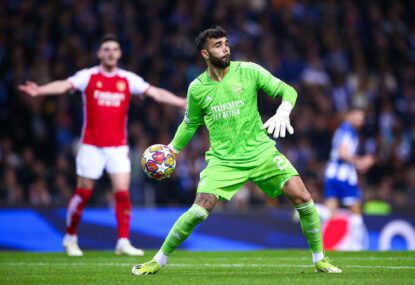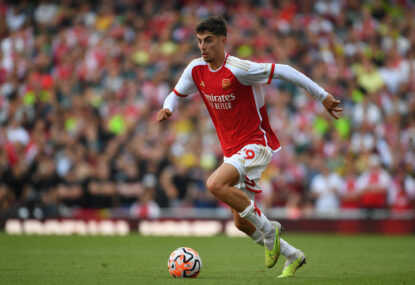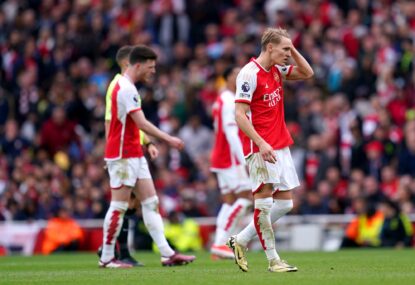One major talking point in football is cracking the code of playing home and away. A trivial matter to ponder over, but an inescapable factor that has a bearing on the prospects of any team’s success.
Many a great team have suffered playing away from home against modest opponents, which just shows how challenging playing ‘away’ can be.
Barcelona, Real Madrid, Machester United and AC Milan, for all their supremacy, are also victims of losses away from home.
For instance, Wigan Athletic FC may not be an illustrious team in the English Premier League but it is a threat playing at home, as was evident in their victories over high-profile teams such as Newcastle and Liverpool this season.
However, they fail to compete at the same level when playing away, which once again proves that registering an away win is indeed a totally different ball-game.
Pragmatically speaking, veering away from sport for a moment, there is an element of timidity in all of us when we stay over at an acquaintance’s residence, no matter how good the camaraderie. Does the same principle apply to teams playing away from ‘home’?
But, in the end, it’s a game we’re talking about, so, why is it so difficult? Do managers adopt different tactics away from home? Should they? And by the way, are referees influenced by the pressure of home fans when making a crucial decision?
Staying with referees, research was done at the Harvard University on 5,000 English Premier League games for a period of 14 years from 1992 to 2006 to determine whether home crowd support had a sway over officiating decisions. Results revealed that for every additional 10,000 supporters, home team advantage increased by 0.1 goals and that inexperienced referees awarded penalty kicks to the home team more often than not.
Now, that’s quite an astonishing fact.
When Tottenham Hotspur (playing away) lost to Real Madrid at the Santiago Bernabeu in the first leg of the quarter-finals of the Champions league competition in 2011, Jermaine Jenas claimed that one of the reasons for the loss was the inexperience of referee Felix Brych.
The referee gave striker Peter Crouch the marching orders for two bookable offences in the first 15 minutes! Now, whether Brych succumbed to the pressure of home fans, only he would know. But, it does throw up yet another debatable aspect in the beautiful game.
Apart from crowd support, visiting teams have to grapple with external dynamics such as travel time (and subsequent fatigue), time zones and environmental factors like extreme weather and altitude. This is especially so the Champions league competition as opposed to domestically, and are major elements fans conveniently disregard.
Let’s also not forget that the home team is much more accustomed to the size of the field since the dimensions of each field differ in the range of 100-130 yards in length and 50-100 yards in width.
Also, the intensity and height of the grass varies from one stadium to another. When Arsenal moved to their new home, the massive Emirates stadium in the mid noughties, the team struggled to register home wins on a consistent basis initially. Ex-Gunner Fabregas then came out saying the players were still getting used to the dimensions and grass on the park.
So, although all grounds look similar, players need a significant amount of time to adapt to the conditions of the park and it becomes even harder for away players to make that adjustment in a short span of time.
Crowd support has an enormous impact on not just the final outcome of a game but on the players as well. Home supporters can inspire the home team to raise their performance and encumber the opposition’s to a large extent, which draws me to one of the most unrivalled features – the state of mind.
As is fashionable these days, visiting players are constantly taunted by home fans and it takes a herculean mental effort on part of each (visiting) player to negate the gibes. These can have a damaging influence on the mind, thereby hampering performance.
No amount of training can replicate a hostile situation which is why one needs to have the mental prowess and adroitness to thrive in the most hostile situations.
When the world of sport was rocked in 2010 with news about superstar Wayne Rooney’s off-field extravagance, he opted out of playing Manchester United’s subsequent match at Goodison Park (home to Everton FC) to escape spur-of-the-moment adverse crowd behaviour to add to the already-existing ridicule (Rooney being a former Everton player).
Manager Sir Alex Ferguson said, “We made the decision simply because Wayne gets terrible abuse here and we’re not going to subject him to it”.
There’s no fixed formula to solve the home and away conundrum but, from a fan’s perspective, it throws up a new challenge to the players that mushrooms the excitement of the game even further.
Winning away from home is never easy and demands a lot from the players. Maybe, soccer federations should consider awarding four points instead of three for an away win!


































































































